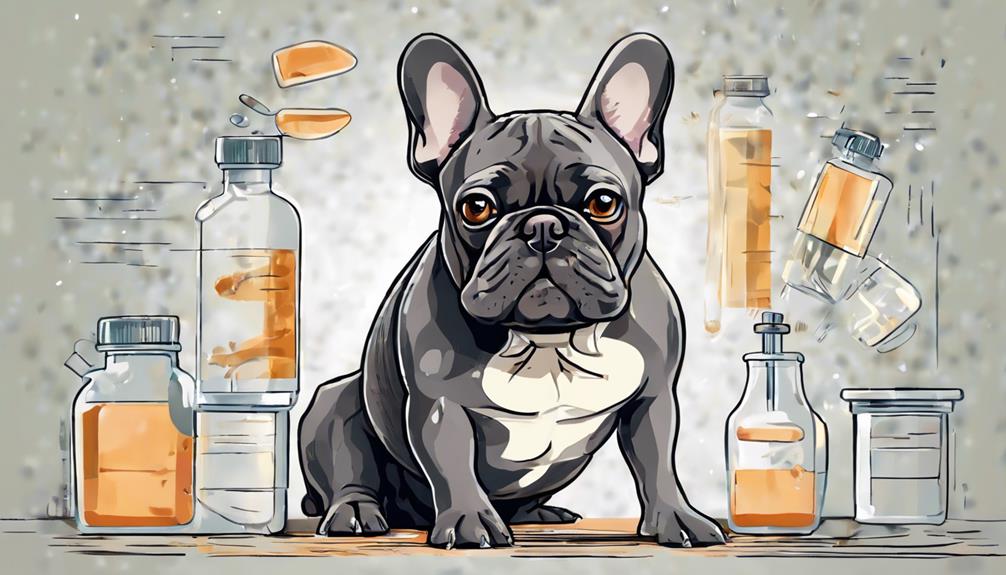Exploring Hormonal Disorders in French Bulldogs
Explore hormonal disorders in French Bulldogs, like thyroid issues causing weight fluctuations and coat changes. Diabetes can affect blood sugar levels, managed through insulin, diet, and exercise routines. Cushing's Disease shows symptoms such as increased thirst and weight gain, treatable with medication or surgery. Addison's Disease results in electrolyte imbalances, needing hormone replacement therapy. Hyperestrogenism alters behavior, requiring prompt veterinary care. Delve deeper into how each condition impacts your French Bulldog's health for optimal management and care.
Thyroid Disorders
What're the common symptoms of thyroid disorders in French Bulldogs?
Thyroid imbalances can manifest in various ways in French Bulldogs, affecting their overall health and well-being.
One of the key signs of a thyroid disorder in French Bulldogs is weight management issues. Hypothyroidism, a condition where the thyroid gland doesn't produce enough thyroid hormones, can lead to weight gain despite a reduced appetite. On the other hand, hyperthyroidism, an overproduction of thyroid hormones, may result in weight loss even when the dog is eating more than usual.
Additionally, French Bulldogs with thyroid imbalances may exhibit changes in their energy levels. Hypothyroidism can cause lethargy, weakness, and a reluctance to engage in physical activities. Conversely, hyperthyroidism may make the dog restless, overly active, or anxious.
Skin and coat problems are also common symptoms of thyroid disorders in French Bulldogs. Dogs with hypothyroidism may have dry, flaky skin and a dull, brittle coat, while those with hyperthyroidism might experience excessive shedding and oily skin.
It is crucial for French Bulldog owners to monitor their pet's weight, energy levels, and coat condition regularly to detect any potential thyroid issues early. Consulting with a veterinarian for proper diagnosis and treatment is essential to ensure the health and happiness of French Bulldogs with thyroid disorders.
Diabetes Mellitus
Diabetes Mellitus in French Bulldogs commonly presents as a metabolic disorder affecting their blood sugar regulation. This condition is characterized by either a lack of insulin production or the body's inability to respond to insulin effectively. When managing diabetes in French Bulldogs, a crucial aspect is insulin therapy. Administering insulin as prescribed by your veterinarian is essential to help regulate your dog's blood sugar levels. Regular blood glucose monitoring is also necessary to ensure that the insulin dosage is appropriate and to make any necessary adjustments.
In addition to insulin therapy, diet management plays a significant role in controlling diabetes in French Bulldogs. Your veterinarian may recommend a specific diet tailored to your dog's needs, which can help regulate blood sugar levels and maintain a healthy weight. It's essential to follow the recommended feeding schedule and portion sizes to prevent fluctuations in blood glucose levels.
Alongside insulin therapy and diet management, incorporating an exercise routine into your French Bulldog's daily activities can be beneficial. Regular physical activity helps improve insulin sensitivity and promotes overall well-being. Consult with your veterinarian to establish an exercise plan suitable for your dog's age, health status, and fitness level. By combining insulin therapy, diet management, and exercise, you can effectively manage diabetes in your French Bulldog and provide them with a high quality of life.
Cushing's Disease
Cushing's Disease in French Bulldogs manifests as a hormonal disorder that affects the function of the adrenal glands. This condition is primarily caused by excessive production of cortisol, a hormone that plays a crucial role in various bodily functions. One of the common symptoms of Cushing's disease in French Bulldogs includes increased thirst and urination, which can lead to accidents indoors. Additionally, affected dogs may experience weight gain, lethargy, muscle weakness, and a pot-bellied appearance. These symptoms may worsen over time if left untreated.
When it comes to the treatment of Cushing's disease in French Bulldogs, there are several options available. One approach is the use of medication to help regulate the production of cortisol. Trilostane is a commonly prescribed medication that can help manage the symptoms associated with Cushing's disease. Regular monitoring of cortisol levels and overall health is essential when using medication to ensure the effectiveness of the treatment.
In some cases, surgery may be recommended to remove adrenal tumors causing the excessive cortisol production. However, surgery is usually considered when medication fails to control the symptoms or in certain tumor types. It's crucial to consult with a veterinarian to determine the most appropriate treatment plan for your French Bulldog based on the individual characteristics of the disease.
Hypoadrenocorticism
Hypoadrenocorticism, also known as Addison's disease, is a hormonal disorder characterized by insufficient production of adrenal hormones. In French Bulldogs, this condition can lead to electrolyte imbalances, specifically low sodium and high potassium levels, which can result in symptoms like weakness, vomiting, diarrhea, and potentially life-threatening complications.
French Bulldogs have a genetic predisposition to developing hypoadrenocorticism, making it crucial for breeders and owners to be vigilant for any signs or symptoms. However, diagnosing this condition can be challenging due to its nonspecific clinical signs that overlap with other health issues. Veterinary professionals often rely on a combination of clinical signs, blood tests measuring electrolyte levels, and hormonal tests to confirm a diagnosis.
Once diagnosed, treatment options for hypoadrenocorticism typically involve hormone replacement therapy to supplement the deficient adrenal hormones. This treatment aims to stabilize electrolyte levels, alleviate symptoms, and improve the dog's quality of life. Regular monitoring of electrolytes and hormone levels is essential to adjust the treatment regimen as needed and ensure the French Bulldog's well-being.
Understanding the genetic predisposition, diagnostic challenges, and available treatment options for hypoadrenocorticism in French Bulldogs is crucial for early detection and effective management of this hormonal disorder. Owners and breeders should work closely with veterinarians to provide the best possible care for affected dogs.
Hyperestrogenism

Hyperestrogenism in French Bulldogs can manifest as an abnormal increase in estrogen levels, potentially leading to various hormonal imbalances and associated clinical symptoms. This condition can result in significant behavioral changes, such as increased aggression or restlessness, which may be concerning for pet owners. Additionally, hyperestrogenism can contribute to weight gain despite no changes in diet or exercise, a common symptom observed in affected French Bulldogs.
Skin issues are also prevalent in cases of hyperestrogenism. Dogs may experience hair loss, particularly around the trunk, tail, and back legs. The skin may become thin and fragile, predisposing the dog to injuries and infections. Furthermore, urinary problems can arise due to the effects of excess estrogen on the urinary tract. French Bulldogs with hyperestrogenism may exhibit signs of urinary incontinence or have difficulties urinating normally.
Monitoring for these clinical signs is crucial for early detection and management of hyperestrogenism in French Bulldogs. If you notice any unusual behaviors, unexplained weight changes, skin abnormalities, or urinary issues in your pet, it's essential to consult with a veterinarian promptly. Treatment options may include hormone therapy or surgical interventions to address the underlying hormonal imbalances and improve the quality of life for affected dogs.
Hypopituitarism
A deficiency in pituitary gland function, known as hypopituitarism, can lead to a range of hormonal imbalances and associated clinical manifestations in French Bulldogs. This condition often results in growth hormone deficiency, which can lead to stunted growth, delayed development of secondary sexual characteristics, and metabolic disturbances. Clinical signs of hypopituitarism in French Bulldogs may include lethargy, weight gain, poor coat quality, and reproductive issues.
When addressing growth hormone deficiency in French Bulldogs with hypopituitarism, treatment options typically involve hormone replacement therapy. This therapy aims to restore normal growth and metabolic function by supplementing the deficient hormones. Regular monitoring of hormone levels and clinical response is crucial to adjust the treatment regimen accordingly and ensure optimal outcomes.
In some cases of hypopituitarism, a pituitary tumor may be the underlying cause. When a tumor is present, surgical intervention may be necessary to remove it and alleviate the hormonal imbalances. Surgery should be performed by a skilled veterinary surgeon experienced in pituitary procedures to minimize risks and improve the chances of a successful outcome.
Hyperparathyroidism

Hyperparathyroidism in French Bulldogs results from excessive secretion of parathyroid hormone, leading to disturbances in calcium metabolism and potential clinical consequences. This condition often manifests as elevated blood calcium levels, known as hypercalcemia. The parathyroid glands, located near the thyroid gland, play a crucial role in regulating calcium levels in the body. When these glands produce an excess of parathyroid hormone, it can result in the abnormal release of calcium from the bones into the bloodstream, leading to hypercalcemia.
In cases of severe hyperparathyroidism in French Bulldogs, treatment may involve parathyroid surgery to remove the affected gland or glands. This procedure aims to normalize the levels of parathyroid hormone and calcium in the blood. Monitoring calcium levels post-surgery is crucial to ensure they remain within the appropriate range.
Renal complications are common in French Bulldogs with untreated hyperparathyroidism. Hypercalcemia can lead to the formation of calcium deposits in the kidneys, potentially causing kidney stones or even kidney failure. Therefore, it's essential to manage the dog's diet to control calcium intake and prevent further renal issues. A veterinarian may recommend a specialized diet low in calcium to help manage the condition effectively. Regular monitoring of calcium levels and renal function is essential for French Bulldogs diagnosed with hyperparathyroidism.
Hyperaldosteronism
The excessive secretion of aldosterone, a hormone responsible for regulating electrolyte balance and blood pressure, can lead to Hyperaldosteronism in French Bulldogs. Hyperaldosteronism often results from abnormalities in the renin-angiotensin system, leading to an overproduction of aldosterone by the adrenal glands.
In Hyperaldosteronism, the increased aldosterone levels cause the kidneys to retain more sodium and excrete more potassium, leading to electrolyte imbalances. This can manifest clinically as symptoms like weakness, muscle cramps, increased thirst, and frequent urination in affected French Bulldogs.
When diagnosing Hyperaldosteronism, veterinarians typically perform blood tests to assess electrolyte levels and may conduct imaging studies like ultrasound to evaluate the adrenal glands. Treatment for Hyperaldosteronism often involves medications to regulate aldosterone levels and correct electrolyte imbalances. In severe cases or when medication fails to control the condition, surgical intervention to remove the affected adrenal gland may be necessary.
The prognosis for French Bulldogs with Hyperaldosteronism varies depending on the underlying cause, the presence of concurrent conditions, and how early the diagnosis is made. With appropriate treatment and management of electrolyte imbalances, many dogs can lead a good quality of life. Regular monitoring by a veterinarian is essential to adjust treatment as needed and ensure the best possible outcome for French Bulldogs affected by Hyperaldosteronism.
Frequently Asked Questions
Can French Bulldogs With Hormonal Disorders Still Participate in Dog Shows?
Yes, French Bulldogs with hormonal disorders can still participate in dog shows. Training strategies can help manage their condition and ensure they can perform well.
Regular grooming techniques can also maintain their appearance.
What Are the Potential Behavioral Changes in French Bulldogs With Hormonal Disorders?
When dealing with hormonal disorders in French Bulldogs, you may notice various behavioral changes. These can lead to training challenges and socialization issues.
Behavioral therapy and specific training techniques can be beneficial in addressing these issues. Consistent training sessions, positive reinforcement, and patience are key in helping your French Bulldog adapt to any behavioral changes caused by hormonal disorders.
Proper socialization and professional guidance can also play a crucial role in managing these challenges effectively.
Are There Specific Dietary Recommendations for French Bulldogs With Hormonal Disorders?
For French Bulldogs with hormonal disorders, specific dietary recommendations can include incorporating nutritional supplements to support hormone balance. Alternative therapies like herbal remedies may also be beneficial.
Lifestyle modifications, such as regular exercise and stress management, can complement the dietary plan.
Consult with a veterinarian to create a comprehensive approach that combines dietary adjustments with alternative therapies for optimal management of hormonal disorders in French Bulldogs.
How Do Hormonal Disorders in French Bulldogs Affect Their Ability to Reproduce?
Hormonal disorders in French Bulldogs can significantly impact their ability to reproduce. These conditions can lead to fertility challenges and breeding restrictions due to disruptions in the dog's reproductive health.
Breeding complications may arise as a result of hormonal imbalances affecting the dog's reproductive organs and functions. It's crucial to address these disorders promptly to ensure the well-being of both the French Bulldog and its potential offspring.
Can Hormonal Disorders in French Bulldogs Be Managed Without Medication?
You can manage hormonal disorders in French Bulldogs without medication by incorporating natural remedies and a holistic approach.
Lifestyle modifications and alternative therapies can be beneficial in regulating hormone levels and promoting overall well-being. Some options include dietary changes, herbal supplements, acupuncture, and stress reduction techniques.
Consulting with a veterinarian who specializes in holistic care can help tailor a treatment plan that aligns with your French Bulldog's specific needs and health goals.
Conclusion
In conclusion, French Bulldogs are prone to various hormonal disorders such as thyroid disorders, diabetes mellitus, Cushing's disease, hypoadrenocorticism, hyperestrogenism, hypopituitarism, hyperparathyroidism, and hyperaldosteronism.
It's crucial for owners and veterinarians to be aware of these potential health issues in order to provide early detection, proper diagnosis, and appropriate treatment for affected dogs.
Further research and monitoring are necessary to better understand and manage hormonal disorders in this breed.
